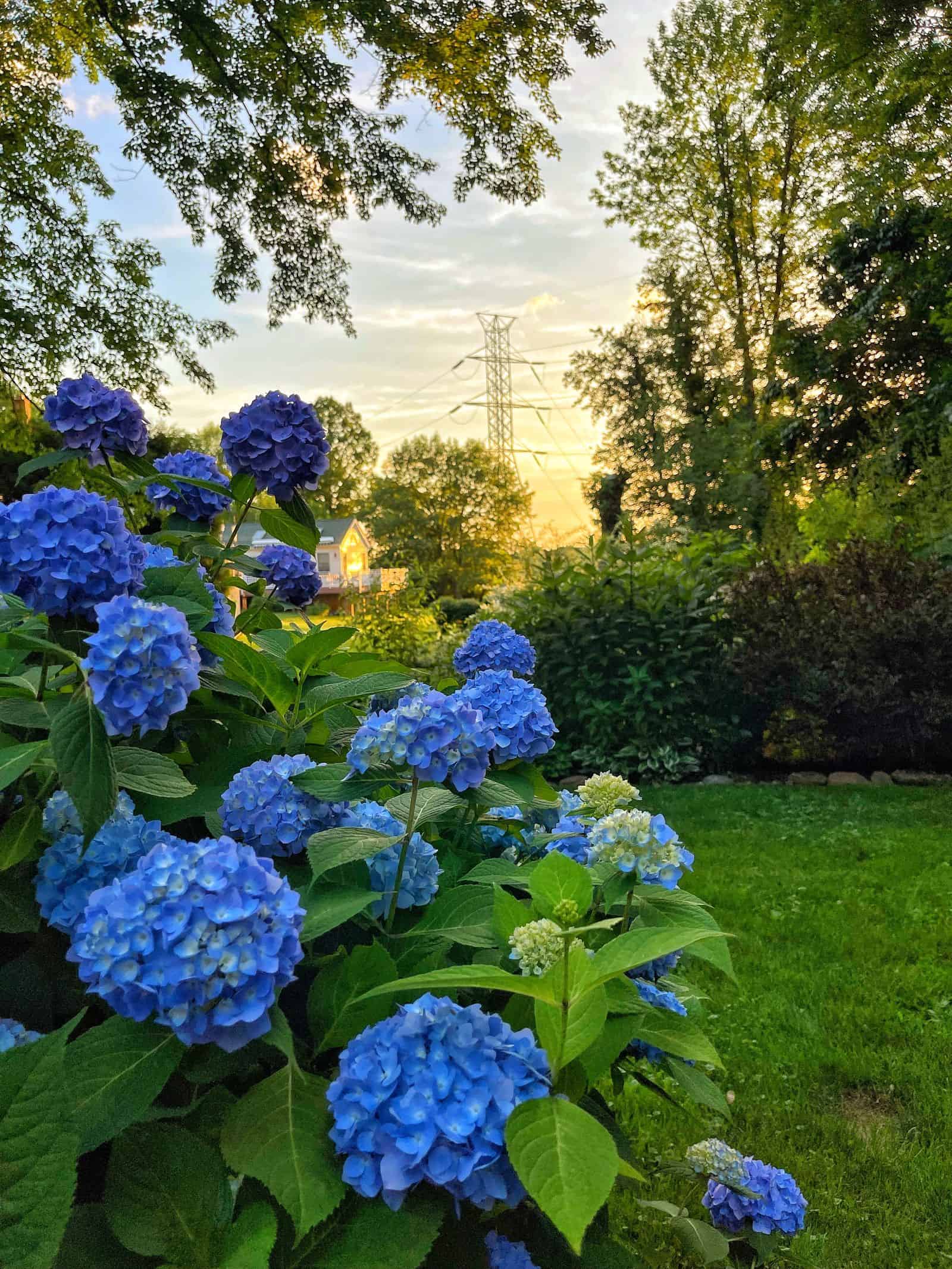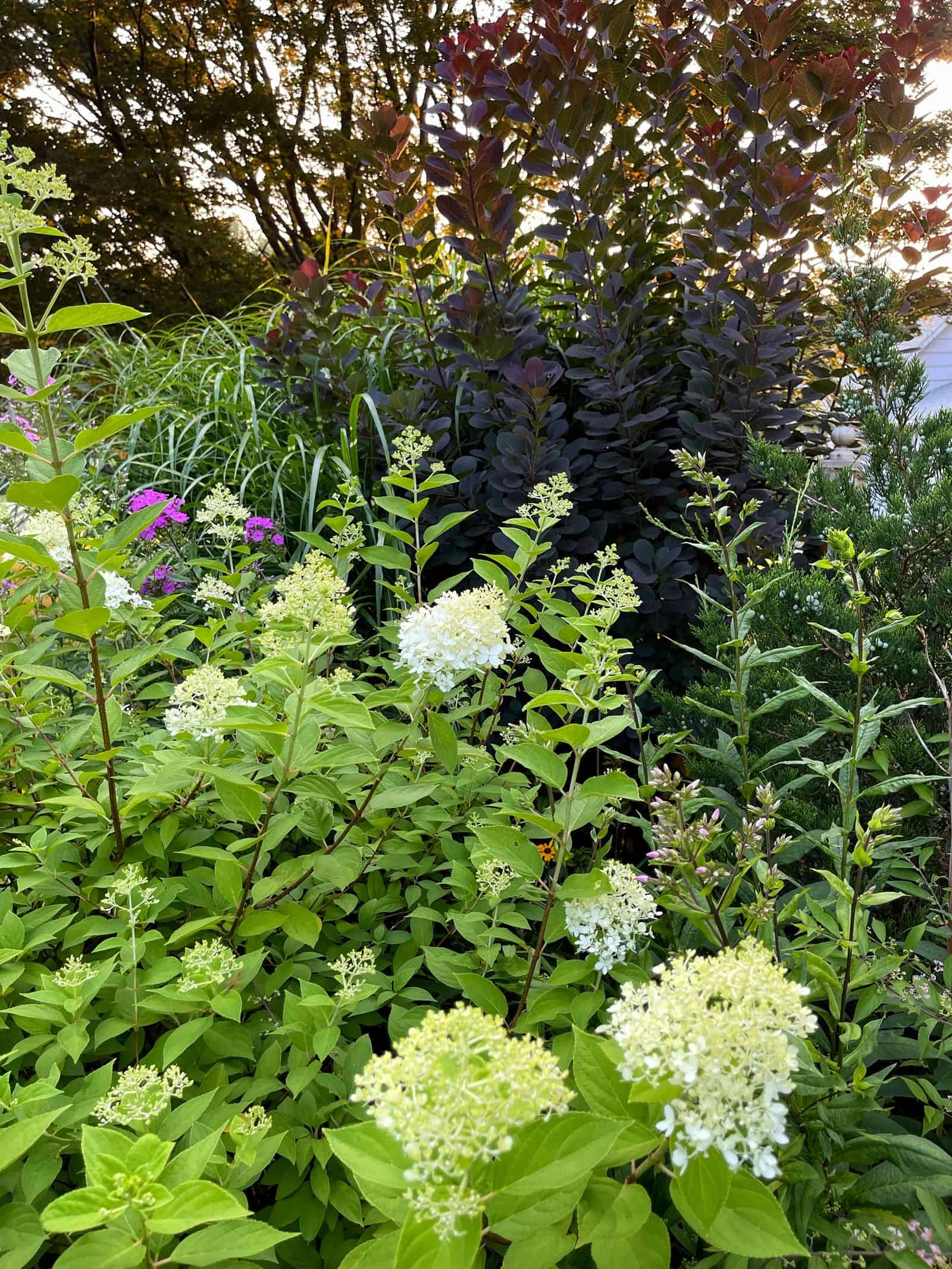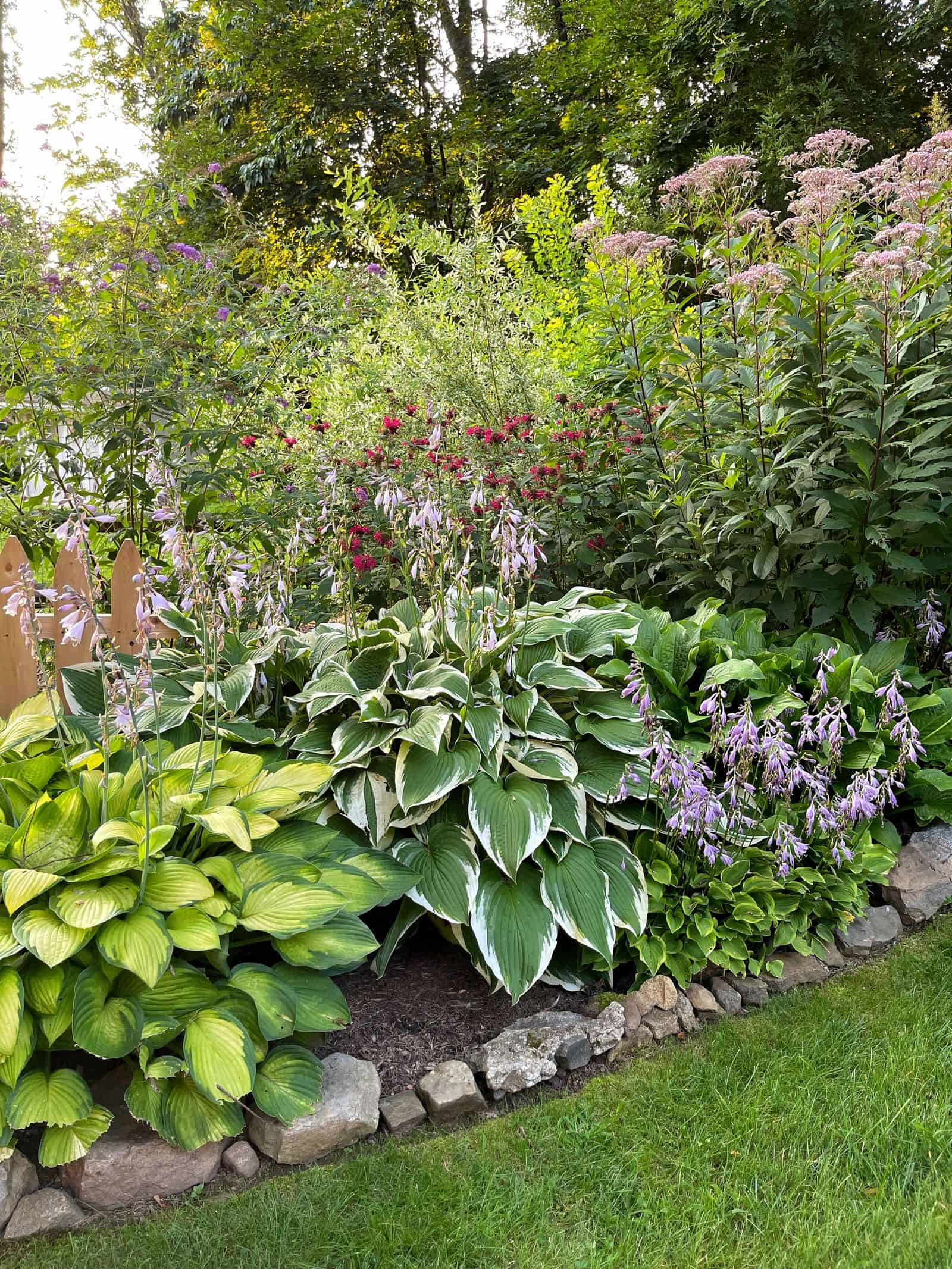Have you ever wondered to yourself, “are hydrangeas deer resistant?” With lots of diverse opinions out there, the answer may surprise you. Learn everything you need to know about whether hydrangeas are deer resistant plants with these simple tips.
Hydrangeas are beloved by garden enthusiasts for their stunning blooms and elegant foliage. However, the joy of growing these beautiful shrubs can quickly turn to frustration when they become a tasty snack for hungry deer.
Whether you live in an area with a high deer population or simply want to protect your garden, it’s essential to understand the relationship between hydrangeas and deer
In this post, we’ll break down whether hydrangeas are susceptible to deer damage as well as the best deer repellent strategy to deter them from eating your garden plants.
So if you are wondering whether deer eat hydrangeas, I got you. Here’s what you need to know.
(Posts on stacyling.com may contain affiliate links. Click HERE for full disclosure.)
Hydrangea and Deer: A Delicate Balance
Deer can be a nuisance in many gardens, as they’re known to munch on a wide variety of plants, including hydrangeas. However, the term “deer-resistant” should be taken with a grain of salt, as no plant is entirely immune to deer browsing.
Deer may sample different plants, and the degree of damage depends on factors like the availability of other food sources, the local deer population, and the time of year.
But Are Hydrangeas Deer Resistant?
The answer is…
It really depends. Because it depends on where you live, the deer population, weather conditions, and the variety of hydrangeas you have, hydrangeas may or may not be more deer-resistant.
Having gardening friends from around the world, they have very different opinions on this very topic. Some will argue deer never touch their hydrangeas. While others will tell you deer devour them.
Where I live and garden, if I’m asked, “are hydrangeas deer resistant?” my answer is no. They all need protection from browsing.

Are Hydrangeas Deer Resistant Gardening Zone 6a, New Jersey
Given so many gardeners have a variety of opinions on whether deer eat hydrangeas or not, I’m here to tell you that if you live in the New Jersey area, they do.
Rutgers Cooperative Extension shared a study that rates all plants by deer resistance and the results are the same for all hydrangeas. They are each rated with an occasionally severely damaged rating.
To give you an idea of what plants are rated with a similar rating, here are a few in the same category:
- Daylily
- Dahlia
- Cosmos
- Fall Mums
- Gerbera Daisy
- Hollyhock
- Hybrid Tea Rose
- Japanese Eunonymous
- Pansy
- Shasta Daisy
So if this list gives you glimpse into just how palatable they are to deer, now you know they need protection.

Are Limelight Hydrangeas Deer Resistant?
Another common question because so many people grow them is about the beautiful panicle hydrangea, Limelight. Whenever I am asked do deer eat limelight hydrangeas, much like my answer above, the answer is unfortunately no too.
I planted a limelight hydrangeas both here and in my former garden and if I did not protect it with repellent, deer would snack on them.
So if you have any kind of panicle hydrangeas and deer are in the area, I suggest spraying the leaves with deer repellent when the foliage emerges and every month after. And possibly spray more often than that if there is a large herd or an abundance of rain.
It’s equally important to spray limelight hydrangea flowers too as they emerge and again when they start to bloom.
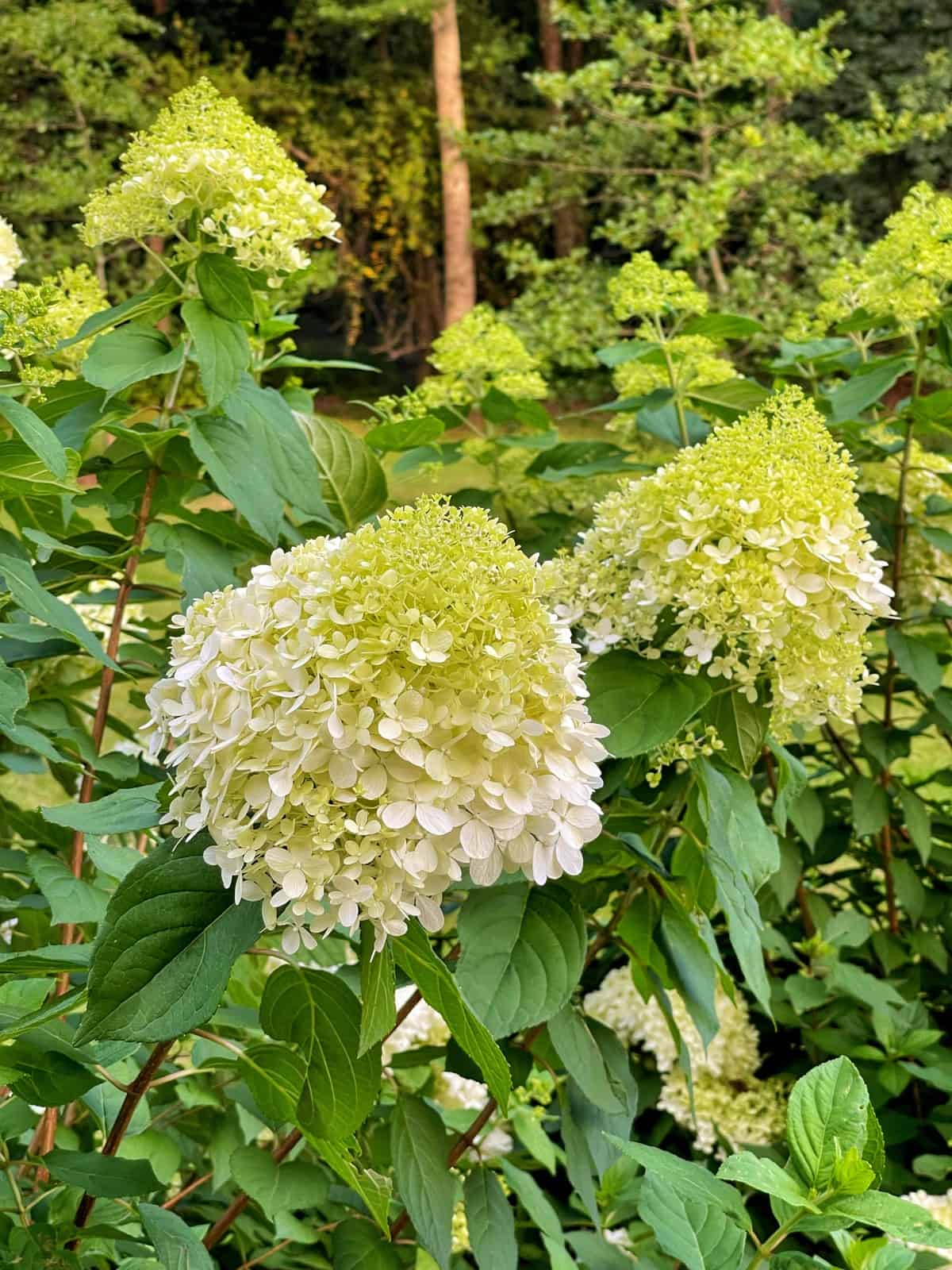
Are Oak Leaf Hydrangeas Deer Resistant?
Much like Limelight Hydrangeas and other varieties, the Oak Leaf Hydrangea isn’t much better where deer are concerned. Some believe they are more resistant than other types of hydrangeas, but in my neck of the woods, deer eat oak leaf hydrangeas.
That said, I had an oak leaf hydrangea in my old country garden and did not protect it with any sort of repellent or fencing. But it was off the path and the deer never came across it.
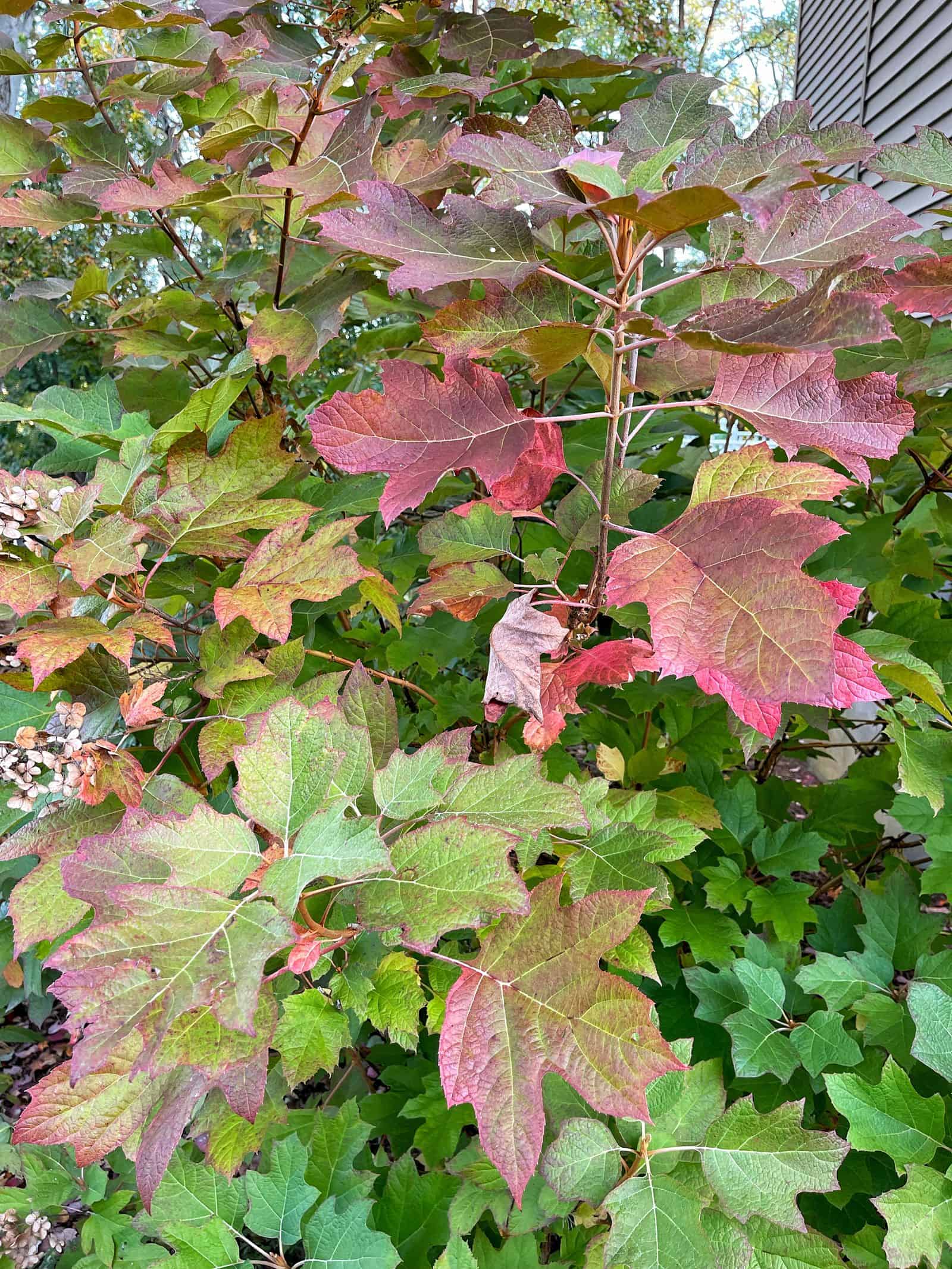
Are Lacecap Hydrangeas Deer Resistant?
Lacecap hydrangeas, like other types of hydrangeas, are not considered deer-resistant. Deer may eat them, especially if food is scarce. However, the level of damage can vary depending on the local deer population and availability of other food sources. I grow lacecap hydrangeas in a fenced in area in my flower garden to deter deer browsing.
Are Climbing Hydrangeas Deer Resistant?
Climbing hydrangeas (Hydrangea anomala subsp. petiolaris) are generally not considered deer-resistant. Like other types of hydrangeas, they can be attractive to deer, especially if other food sources are limited. However, climbing hydrangeas’ growth habit can sometimes offer them a bit more protection if they are growing on tall structures or in less accessible locations.
Are Smooth Hydrangeas Deer Resistant?
Smooth hydrangeas (Hydrangea arborescens), like other hydrangea species, are not generally considered deer-resistant. Deer may browse on smooth hydrangeas, particularly when other food sources are scarce. The soft, lush foliage and tender stems can be attractive to hungry deer so they’ll need protection. I grow a few smooth hydrangeas in my backyard garden that is completely fenced in.

Why You Should Deer Proof Hydrangeas
Because I don’t want to mess around with my garden plants, I always defer to the Rutgers Cooperative Extension who studied all different kinds of plants and their deer resistance. But regardless of how resistant a plant is, if deer are hungry enough, they will eat any plant. So keep in mind that no plant is completely deer-proof.
However, Rutgers categorized plants with ratings of Rarely Damaged, Seldom Severely Damaged, Occasionally Severely Damaged, and Frequently Severely Damaged.
So check this list to see how your garden plants rate because it is chock-full of great information. Even if you aren’t located in my neck of the woods, it’s still a great resource to use when determining what to plant in your garden.
NOTE: Local deer populations and weather conditions can affect the success of any of these plants. Like I said, if deer are hungry enough, they’ll eat anything.
Gardening Tip: If you live in an area that is prone to deer damage, choose plants from the rarely and seldom severely damaged list in your landscapes.
According to Rutgers, several varieties of hydrangeas (oak leaf, big leaf, climbing, smooth, and panicles) are rated as occasionally severely damaged. So what does that mean?
It means, if we want to grow them, we have to protect them. Although gardeners from around the world have different opinions, I recommend erring on the side of caution if there are deer populations in your locality.
To get you thinking about options, here are 7 effective ways to protect hydrangeas and other susceptible plants from deer damage. And if you are looking for other plants to include in your garden that are deer-resistant, here is my list of the best cottage garden flowers.

Quick Ways to Deer Proof Hydrangeas
Here are a few strategies to keep deer from eating hydrangeas.
- Fencing: Install a sturdy 8-foot deer fence or a double fence around your garden.
- Repellents: Apply deer repellents to your plants, which emit odors that are unpleasant and taste bad to deer.
- Companion Planting: Integrate deer-resistant plants around your hydrangeas to create a less attractive environment for deer.
- Motion-Activated Devices: Install motion-activated sprinklers or lights to startle and deter deer.
- Get a dog: When they are outside dogs can keep deer away and mark their territory.
- Walk your gardens daily to keep an eye on things and catch problems early.
To learn more about each one, you can check out this handy guide.

The Best Deer Repellent Strategy
I’ve been gardening in a high deer population area for well over 25 years. Where I live in New Jersey, Zone 6a, deer will devour certain plants in a day if they aren’t protected well. But how can I grow a wide variety of plants given the high population of deer in my locality?
Believe me, they visit my property too. I see herds of deer walking around my neighborhood. To protect my gardens, I employ a variety of deer proofing strategies as well as grow plants that are on the rarely and seldom severely damaged plant list according to Rutgers.
That said, I also grow LOTS of plants that deer love such as hostas, tulips, and roses. But I make it less palatable for them through the use of deer repellent.
Do not underestimate the power of deer repellents. Cause they work!
When used consistently and often, it is a very effective means of keeping deer from eating hydrangeas and other garden flowers. Throughout the years, I have tested and used a variety of deer repellent sprays to deter deer browsing.

My favorite brand that I’ve been consistently using for several years is Deer Out. In comparison to other brands, I’ve found the nozzle does not clog, it doesn’t smell terrible and most importantly, it works!
But then, I started using a two-prong deer repellent strategy that worked really well too. In addition to using the spray repellent, I added a granular repellent for additional protection, called Deer Scram, that is applied around the perimeter of your property, garden, or even plants.
Because I used to live on half an acre, I used one bucket for my entire property in one application. And when I started using both, I found no evidence of deer damage at all.
(The one exception was after SO MUCH RAIN that I needed to reapply the repellents sooner – my mistake. More about this below).
But then, I started using this deer repellent that is systemic instead of just being topical. And it works amazing! The only drawback is it stains the plants initially but does wash off after a bit. I would not spray them on white flowers. It’s not worth the risk. Go with Deer Out instead.

How to Deer Proof Your Garden With Deer Repellents
This is how I’ve been applying spray repellents every year and has worked very well for me.
- Purchase deer repellent in late winter. Trust me when I tell you, be prepared because highly susceptible plants will pop out of the ground before you know it.
- Apply the first spray application to susceptible plants when they first break ground or leaf out in early spring.
- Reapply when they are halfway to maturity.
- Then again when they are fully leafed out or ready to bloom (like tulips).
- From this point on in early spring, plan to spray deer repellent on susceptible plants 1x per month. If it rains, do it a little sooner than that.
- If you have herds of deer living on the property that literally eats everything, I recommend spraying every 1-2 weeks initially depending on the damage they do and the size of the population.
Because deer are creatures of habit and follow patterns, once they learn they don’t love your garden plants, they will find a different path. This does not mean you should let your guard down and keep up with the deer-repellent strategy.

More About Using Granular Deer Repellent
I started using this granular in May 2021 and apply it within a day or two of spraying my plants so my deer-proofing is done around the same time. (With my gardens, it takes some time to spray plants, so I break it up).
The granular works like a barrier. It’s really stinky though and my dogs want to eat it, so don’t apply it around your pets. Since my former garden was half an acre, I applied it around the perimeter of my yard 1x per month to keep deer from crossing it.
When I was solely using the deer repellent spray, we would still get deer in my yard. They’d walk through or graze on the crabapples that drop from my flowering crabapple. But I’ve noticed with the granular, they stopped entering my property.
That said, July 2021 was a really wet month in New Jersey. And I noticed some nibbles on my limelight hydrangeas. Which tells you how much limelight hydrangeas are not deer resistant.
So it’s really important to pay attention to the weather because lots of rain will wash the repellent away quickly. That was my mistake. I should have re-applied at 3 weeks instead of a month.
But it happens. That is why it is so important to walk your gardens EVERY DAY to watch for signs of damage and manage accordingly.

What If You Live in a Different Locality: Are Hydrangeas Deer Resistant?
Since there are many diverse opinions on whether or not deer eat hydrangeas, I would err on the side of caution. If you live in a locality where deer are not an issue, then maybe you don’t need to worry about your hydrangeas as much.
But if you’ve heard that there are certain hydrangea varieties that are more resistant than others, I’m here to tell you, to be careful and protect your hydrangeas anyway.
Rutgers tested this and it’s just not worth the risk. I’ve seen nibbles on the very hydrangea plants that have been described as deer-resistant.
Can you risk it though? Sure! They’ll rebound if they are damaged. But you may risk their beauty during the current season.
Of course, I can’t guarantee that any method is 100% effective where deer are concerned. Because deer will eat any plant if they are hungry enough. But the methods I outlined above to protect mine have worked for me, are working for me, and I hope, will work for you too!

Watch the Video to Learn More About Deer Proof Landscaping
There’s so much to say about growing a deer-resistant garden. Watch this video to learn more.
Final Thoughts About Deer Eating Hydrangea
Deer can be a significant challenge for gardeners, especially when it comes to beloved plants like hydrangeas. While hydrangeas are not typically a deer’s first choice, they can still fall victim to hungry deer, particularly in areas where other food sources are scarce.
By understanding the habits of deer and employing a combination of strategies, such as using repellents, installing physical barriers, and selecting deer-resistant plant varieties, you can better protect your hydrangeas and maintain the beauty of your garden.
Remember, no single method is foolproof, so it’s often best to use a combination of tactics for the most effective results. Regularly changing your approach can also help prevent deer from becoming accustomed to any one deterrent. With patience and persistence, you can enjoy your hydrangeas without constantly worrying about deer damage. Happy gardening!
Are deer a problem in your locality? Do deer eat hydrangeas there too? Do you have any deer-proofing tips you’d like to share? I would love to know more in the comments below.
If you have any questions, comments or suggestions, please let me know in the comments below. I’d love to hear! And feel free to share this post with anyone you think would find it helpful too.
To drill down on more beginner gardening techniques and tips, please read these posts:
- Flower Gardening 101
- Growing a Cut Flower Garden for Beginners
- Container Garden Ideas for Beginners
- How to Start a Vegetable Garden
- Herb Gardening for Beginners
Thank you for visiting the blog today!
Enjoy your day! xo


Looking for More Information About Hydrangeas?
Check out these posts!
- The Complete Guide to Hydrangea Care and Their Flowers
- The Basics of Hydrangea Care
- How to Prune a Hydrangea the Right Way
- Why Aren’t My Hydrangeas Blooming?
- How to Divide Hydrangeas
- Propagate Hydrangeas and Grow Your Garden for Free
- The Ultimate Guide to Keeping Fresh Cut Hydrangeas from Drooping
- How to Dry a Hydrangea the Easy Way
- How to Make a Simple Hydrangea Wreath for FREE



